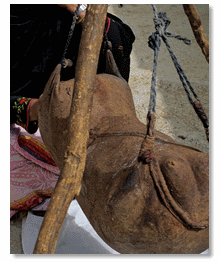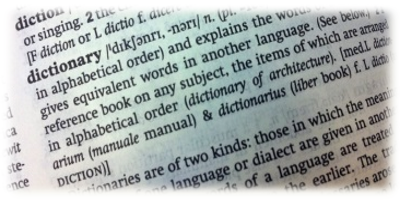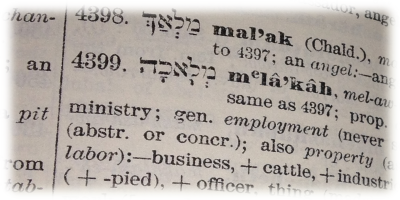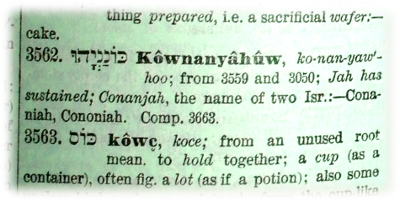Relationship between words
What do all of the words, astronaut, astrology, astronomy, asteroid, starlet, starfish, stellar and asterisk have in common? They are all related to "stars" and each of these words is derived out of the ancient Greek word "aster," meaning "star." These same types of connections between words can be found in the Hebrew language, however, from our modern Western perspective, the connections between the words may not be as apparent? We may understand the connection between hot and sun, but would we connect these two words with bag, cheese, crave and shake? Most likely not, but someone from the ancient Near East, the land of the Bible, most certainly would have.
Cheese, a craved delicacy of the ancient Near East, was made by placing the milk of a sheep or goat in a bag made from the skin of a sheep or goat. The bag is then hung out in the heat of the sun, and shaken. The skins of sheep and goats have a natural enzyme that is released when heated and shaken that separates the whey (water) from the curds (cheese).

Bedouin making cheese from a Goat skin bag
As we have demonstrated each of these words are culturally related, but in addition, they are all etymologically related as they each come from the same root word חם (hham), meaning "hot."
| חם | hham | Hot | ||
| חמה | hham’mah | Sun | ||
| חמת | hhey’met | Skin-bag | ||
| חמה | hhem’ah | Cheese | ||
| חמד | hha’mad | To Crave | ||
| חמס | hha’mas | To Shake |
Each Hebrew word is related in meaning to other words, and these words are themselves related in meaning to other words and roots. By studying related words and their histories, we can better define them within their original context.
Root system of Hebrew words
Like a tree with its roots, trunk, branches and leaves, the Hebrew language is a system of roots and words, where one word and its meaning is the foundation to a number of other words whose spelling and meaning are related back to that one root.
As an example, the root מלך (M-L-K) means "rule." This root can be used as a verb meaning to rule, or as a noun meaning a ruler, or king. Other nouns are created out of this root by adding other letters. By adding the letter ה (H) to the end of the root, the word מלכה (malkah) is formed, which is a female ruler, a queen. By adding a ו (U) to this feminine noun, the word מלוכה (malukhah) is formed meaning "royalty." By adding the letters ות (UT) to the end of the root, the noun מלכות (malkut) is formed meaning the area ruled by the ruler, the kingdom.
By studying the relationship between words and their roots we can better understand the meanings of these words within their original context. Let's take 3 English words found in English translations of the Bible: Maiden, Eternity and Secret. These three words are, from our interpretation, three much unrelated words. But let us examine the Hebrew words behind these translations: עלמה (almah), עולם (olam) and תעלמה (te'almah). Each of these words share the same three letters: ע (ayin), ל (lamed) and מ (mem, the letter "mem" has two forms, ם when it appears at the end of a word, and מ when it appears anywhere else in a word).
Rather than perceiving them as different and independent words, we need to recognize that their meanings are related because they each come from the same root. By interpreting these words in context of their root relationship, we are able to uncover their original meanings.
The root עלם (A-L-M) literally means beyond the horizon, that hazy distance that is difficult to see. By extension it means to be out of sight, hidden from view. עלמה (almah) is the young woman that is hidden away (protected) in the home. עולם (olam) is a place or time that is in the far distance and is hidden to us. תעלמה (te'almah) is something that is hidden away.
Besides being able to find the common meaning in different words of the same root, we are also able to distinguish between different meanings of words that come from different roots. For instance, there are two Hebrew words translated as "moon." One is ירח (yere'ahh), which comes from a root meaning "to follow a prescribed path" and is therefore used for the motion of the moon. The other is לבנה (lavanah), which comes from a root meaning "to be white" and is therefore used for its bright appearance.
When we ignore the Hebraic definitions of the words in the Bible we miss much of what the text is attempting to tell us.
Proper Biblical Interpretation
On a frequent basis we attach a meaning of a word from the Bible based on our own language and culture to a word that is not the meaning of the Hebrew word behind the translation. This is often a result of using our modern western thinking process for interpreting the Biblical text. For proper interpretation of the Bible it is essential that we take our definitions for words from an Ancient Hebraic perspective. Our modern western minds often work with words that are purely abstract or mental while the Hebrew's vocabulary was filled with words that painted pictures of concrete concepts. By reading the Biblical text with a proper Hebrew vocabulary the text comes to life revealing the authors intended meaning.
While the Hebrew word ברית (beriyt) means "covenant" the cultural background of the word is helpful in understanding its full meaning. Beriyt comes from the parent root word בר (bar) meaning grain. Grains were fed to livestock to fatten them up to prepare them for the slaughter. Two other Hebrew words related to beriyt, and also derived from the parent root bar, can help understand the meaning of beriyt. The word ברי (beriy) means fat and ברות (barut) means meat. Notice the common theme with bar, beriy and barut, they all have to do with the slaughtering of livestock. The word beriyt is literally the animal that is slaughtered for the covenant ceremony. The phrase "make a covenant" is found thirteen times in the Hebrew Bible. In the Hebrew text this phrase is כרת ברית (karat beriyt) and literally means "cut the meat." When a covenant is made a fattened animal is cut into pieces and laid out on the ground. Each party of the covenant then passes through the pieces signifying that if one of the parties fails to meet the agreement then the other has the right to do to the other what they did to the animal (see Genesis 15:10 and Jeremiah 34:18-20).
The English word "faith," is defined as "confidence or trust in a person or thing; belief that is not based on proof," but this is not the meaning of the Hebrew word אמונה (emunah), which the King James Version translates as "faith" in Habakkuk 2:4, " The just shall live by faith.." The root of emunah is אמן (aman) meaning to be "firm." Emunah means "steady" in the sense of firmness and is in fact translated this way in the King James Version in the following passage.
...And Aaron and Hur held up his hands, one on one side, and the other on the other side; so his hands were steady until the going down of the sun. (Exodus 17:12)
English definitions to Biblical words will not suffice for interpreting the words of the Bible. If we assume the English definition of "faith" to the Bible, we are going to misinterpret it. From a Hebraic perspective, Habakkuk 2:4 should be interpreted as "the just shall live by their steadiness."

Like what you’re discovering? Continue the journey from Bible reader to translator.
|







